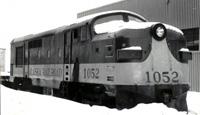 |
Locomotive 1052, image,
large |
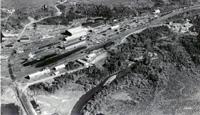 |
Anchorage Yards 1939, image,
large |
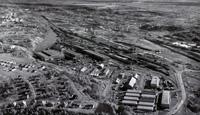 |
Anchorage Yards 1950, image,
large |
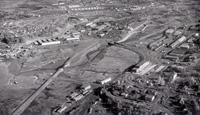 |
Anchorage Yards 1952, image,
large |
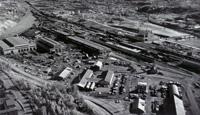 |
Anchorage Yards, image,
large |
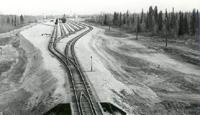 |
Approaching Fairbanks Yards, image,
large |
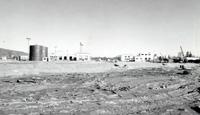 |
Fairbanks Yards circa 1950-1955, image,
large |
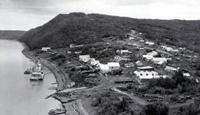 |
Steamship Kaltac Village Yukon River, image,
large |
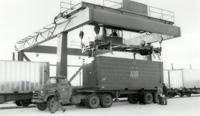 |
Loading a truck, image,
large |
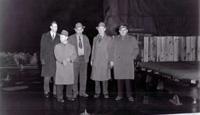 |
Railroad officials, left to right: Mckinney,
Kunz, Williams, Moore, Captain, image, large |
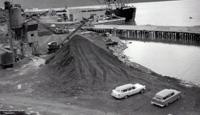 |
Seward Alaska Railroad Dock and surroundings
with the Alaska Steamship vessel Chena docked. This is pre earthquake. Particularly
interesting from the modeling view is the cement plant in the foreground.
The Troop box car is one that was dedicated to moving dry cement. image,
large |
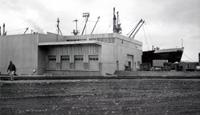 |
Seward Alaska Railroad Dock and surroundings
with the Alaska Steamship vessel Chena docked. This is pre earthquake. image,
large |
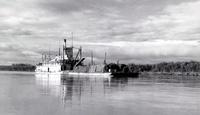 |
SS Nenana, Yukon River, image,
large |
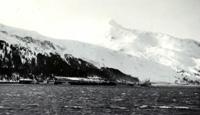 |
Whittier circa 1945. You need to look closely
to see the long warehouse on the RR dock to the
left. image, large |
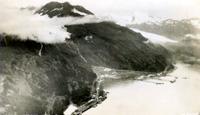 |
Whittier aerial view. This photo shows the finger
piers that served the Army POL and Union Oil and to the far right Colombia
Lumber. image, large |
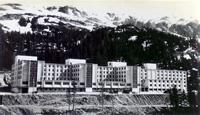 |
Whittier, Buckner Building as built. image,
large |
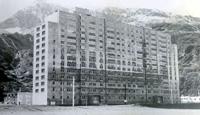 |
Whittier, Hodge Building as built. image,
large |
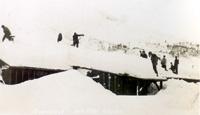 |
Whittier, Snowbound, image,
large |
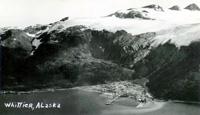 |
Whittier, town view, image,
large |
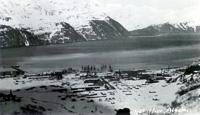 |
Whittier, town view #2, image,
large |
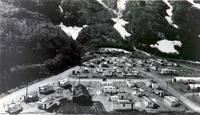 |
The trailer court at Whittier. On the left side,
second trailer up was home to Pat Durand, his mother and father and their
other four children (over the 1957-58 winter). The view was taken from the
back side of the Hodge building while under construction. image,
large |
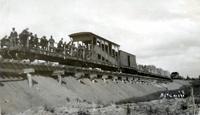 |
The caption date on this photo should most
likely be 1916. The first spike at Ship Creek was not driven until April
29, 1915. Col. Mears, put out a call for plans or a photo of the "rubberneck
car" he had used on the Panama Railroad during construction of the
Panama Canal. H. A. Haag had photographed that car, No. 477, on Feb 22,
1911 in Culebra Cut.
Based on Haag's photograph, the Master Mechanic built a duplicate
on Panama flat No. 708 in the Anchorage Shops. In early photos of the
Anchorage Yard, the car sticks out because of its height. It was commonly
used for inspection trips and provided sun shade and weather protection
for the ladies at the ever popular 4th of July baseball tournaments held
on the hay flats at Potter Section.
Displacement fill was a common construction method across soft
wet ground or other voids. A simple pile trestle could be easily driven
to make the line passable. As base aggregate material was available it
was simply dumped thru the ties to fill the space between the bents as
shown in this photo. image, large |
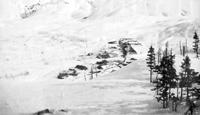 |
Alaska Railroad construction camp 49, 1910.
image, large |
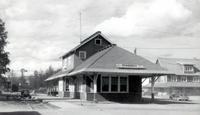 |
Fairbanks depot, 1940s. image,
large |
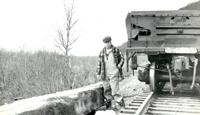 |
Unknown worker standing beside a dump car, 1940s.
image, large |
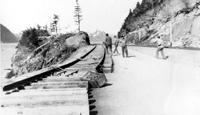 |
The road to Westcamp from Whittier was built
on fill along bluffs in this view looking East toward Whittier. The permanent
ARR tracks going into Whittier are at the right, and up on the hill side,
telephone and Telegraph lines. The workers in military uniform, probably
members of the 714th, are moving a shoe fly track used to place fill. The
track started parallel to the permanent tracks and as the road base was
built up the temp track was moved out to the edge of the fill. Most of early
Whittier was developed on fill placed in this manner. image,
large |
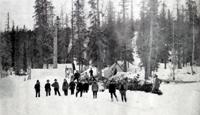 |
Camp Chalk Alaska Central Railroad, 1905. image,
large |
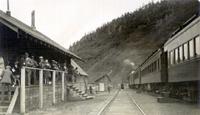 |
Sandwiches and coffee Alaska RR made by Alaska
SS Company. image, large |
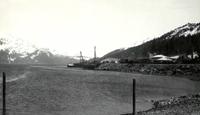 |
Whittier 1945. image,
large |
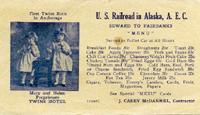 |
Twins Hotel. image |
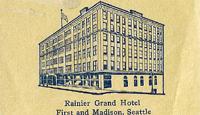 |
Twins Hotel - menu. image |






























